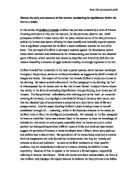Two texts that portray food to lack comfort and nourishment are Text 21 The extract Act V Scene II and Act V Scene III, from Shakespeares tragedy from 1590 Titus Andronicus, and text 22 An extract from the beginning of The Modest Proposal by Jonathan Swift published in 1729
Food is not always shown to be a source of nourishment and comfort.
Compare two texts from the anthology that demonstrates this.
Two texts that portray food to lack comfort and nourishment are Text 21 – The extract “Act V Scene II and Act V Scene III”, from one of William Shakespeare’s earliest tragedy’s from 1590 “Titus Andronicus”, and text 22 – An extract from the beginning of “The Modest Proposal” by Jonathan Swift published in 1729. The purpose of Text 21 is to entertain the reader. It is mainly aimed at adults and fans William Shakespeare. Similarly, text 22 is also meant to entertain the reader. However, even though text 22 could be considered to have an entertainment factor, text 22 is a satirical essay which is argumentative and a rhetorical social commentary, on a solution to the problem of hunger in Ireland in the 18th century. It is mainly aimed at Government and politicians as well as both the rich public of the 18th century.
Text 21 is structured in chronological order. It starts with the scene, where Titus reveals the characters Murder and Rape to be Chiron and Demetrius respectively. Then Titus re-enters with Lavinia and reveals all the wrong that these two people have done to him and his family. This is to remind the audience what has happened in the play and, to evoke sympathy for Lavinia and Titus, and to feel hatred toward Chiron and Demetrius. Titus uses monosyllabic lexis which is short and direct such as “Come, come”. This hints that the speech he is about to give is spontaneous, and it also shows that he doesn’t think he needs to be formal and speak with any respect to the villains. This is different to text 22 as text 22 has long complex sentences with lots of polysyllabic words and punctuation. This makes the text sound formal and educated, because the intended audience was the higher class people of society. The speech has complex sentences mixed with simple ones. For example, “villains for shame you could not beg for grace”. This is to help the audience feel the pace, and to allow the actor to slow down slightly to catch his breath. Titus then addresses the villains directly, divulging how he is going to kill them, and bake them into a pastry, and serve it to their mother to eat. The manner in which he reveals his plans is almost like a recipe. He goes through each step methodically. He talks about how he will prepare the ‘dish’—“I will grind your bones to dust”, “with your blood and it I’ll make a paste”. These phrases create disturbing vivid images in the readers and audiences minds. This shows that food and what they are made of aren’t always nourishing. This is very similar to text 22. In text 22 the author, Jonathan Swift, suggests that to stop the children being a burden to their families and their country, people should eat children and use the hides of children to craft gloves and boots. Again the detailed methodical step by step guide on how to achieve this is akin to how Titus in text 21 tells the villains how he is going to kill them. Again this vivid description is to help the audience and readers imagine he gruesome acts that are about to be performed. This only enhances the fact that the food might not be a source of comfort or nourishment. In text 21, during Act V Scene III when Titus is encouraging them to eat “Will’t please you eat?” is creating dramatic irony, as the audience knows what the pasties are made of but, the characters don’t. The audience will feel nauseated watching the actors eat pies which have human flesh and bones. This only enhances the fact that food is not always a source of nourishment.








